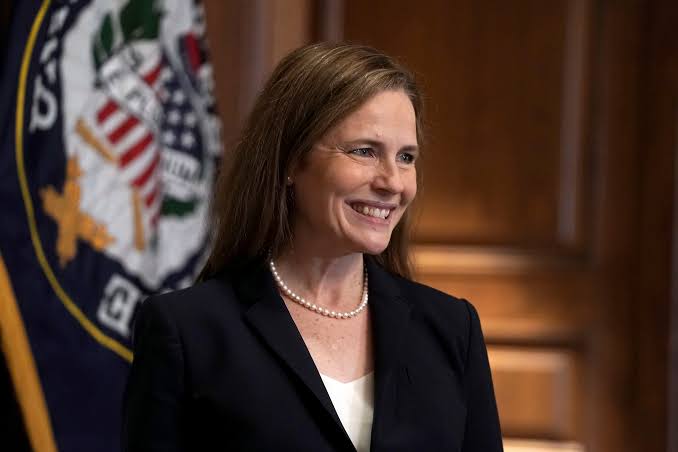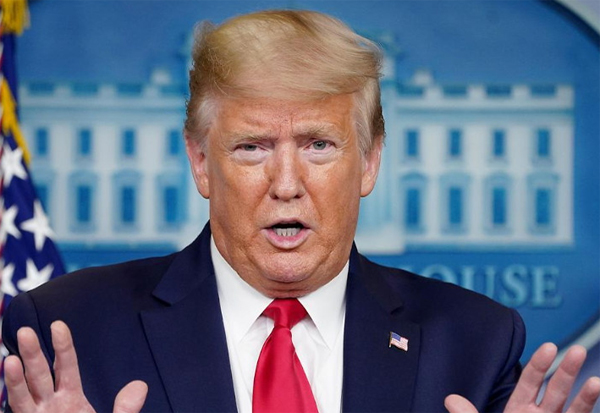The US Senate has confirmed Judge Amy Coney Barrett to the Supreme Court in a victory for President Donald Trump a week before the presidential election.
Mr. Trump’s fellow Republicans voted 52-48 to approve the judge, overcoming the unified opposition of Democrats.
Her appointment seals for the foreseeable future a 6-3 conservative majority on the top US judicial body.
Democratic presidential candidate Joe Biden called the move rushed and unprecedented.
Senate Democratic leader Chuck Schumer said that by going ahead with the vote so close to the election the Republican majority was “lighting its credibility on fire”.
Justice Barrett, 48, took the oath of office at the White House alongside President Trump.
Only one Republican, Senator Susan Collins, who faces a tough re-election battle in Maine, voted against the president’s nominee in Monday evening’s vote.
The new justice is the third appointed by the Republican president, after Neil Gorsuch in 2017 and Brett Kavanaugh in 2018.
READ ALSO: Lekki Shooting: PoI Begins Sitting In Lagos, Urges Victims To Come Forward
The federal appeals court judge from Indiana fills the vacancy left by Justice Ruth Bader Ginsburg, a liberal icon who died last month.
What happened at the White House?
President Trump, just returned from campaigning in Pennsylvania, presided over Justice Barrett’s swearing-in ceremony on Monday night.
Mr. Trump said: “This is a momentous day for America, for the United States constitution and for the fair and impartial rule of law.”
He added: “She is one of our nation’s most brilliant legal scholars and she will make an outstanding justice on the highest court in our land.”
Supreme Court Justice Clarence Thomas, a conservative, administered the oath of office to his new colleague.
Justice Barrett said afterwards: “A judge declares independence not only from the Congress and the president, but also from the private beliefs that might otherwise move her.
“The judicial oath captures the essence of the judicial duty: the rule of law must always control.”
The ceremony took place on the south lawn of the executive mansion, a month after a similar event to unveil Justice Barrett as the president’s nominee was linked to a Covid-19 outbreak that was followed by the president himself testing positive for the disease.
How did Democrats react?
Mr. Biden said the “rushed and unprecedented” appointment served as a “stark reminder to every American that your vote matters”.
“While panicked and erratic in mishandling the pandemic, Donald Trump has been crystal clear on one thing for the past four years… he wants to tear down the Affordable Care Act in its entirety,” he said.
Democratic vice-presidential candidate Kamala Harris said Justice Barrett’s confirmation was “a disgrace, not only because of what she will do when she gets on the bench, but because of the entire process”.
Democrats argued for weeks that it should be up to the winner of the 3 November election to pick the nominee for the Supreme Court vacancy.
But Republican Senate leader Mitch McConnell said on Monday: “We don’t have any doubt, do we, that if the shoe was on the other foot, they’d be confirming. You can’t win them all, and elections have consequences.”
Democrats have threatened to retaliate by court-packing – which would entail expanding the number of justices on the nine-seat Supreme Court – if they win the White House and control of the Senate next week.
Mr. Biden has refused to make clear whether he favours such a step, which could transform the third branch of US government. Mr Biden said last week he would appoint a bipartisan commission to study whether an overhaul of the judiciary was necessary.
On Monday night, the left-wing of his party called for the more radical move. “Expand the court,” tweeted self-described democratic socialist New York congresswoman Alexandria Ocasio-Cortez.
The former Democratic leader of the Senate, Harry Reid, is meanwhile pressing Mr Biden, if Democrats are victorious next week, to go for the so-called nuclear option and scrap the filibuster, the decades-old practice of requiring 60 votes to advance legislation, allowing all bills instead to pass by a simple majority of 51.
When Democrats led the Senate, Mr. Reid ended the filibuster for federal judicial nominees. Then, when Republicans took control, Mr. McConnell went a step further by scrapping the procedure for Supreme Court nominees.
BBC









